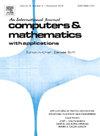Fourier spectral methods based on restricted Padé approximations for space fractional reaction-diffusion systems
IF 2.9
2区 数学
Q1 MATHEMATICS, APPLIED
引用次数: 0
Abstract
By utilizing the power of the Fourier spectral approach and the restricted Padé rational approximations, we have devised two third-order numerical methods to investigate the complex phenomena that arise in multi-dimensional space fractional reaction-diffusion models. The Fourier spectral approach yields a fully diagonal representation of the fractional Laplacian with the ability to extend the methods to multi-dimensional cases with the same computational complexity as one-dimensional and makes it possible to attain spectral convergence. Third-order single-pole restricted Padé approximations of the matrix exponential are utilized in developing the time stepping methods. We also use sophisticated mathematical techniques, namely, discrete sine and cosine transforms, to improve the computational efficiency of the methods. Algorithms are derived from these methods for straight-forward implementation in one- and multidimensional models, accommodating both homogeneous Dirichlet and homogeneous Neumann boundary conditions. The third-order accuracy of these methods is proved analytically and demonstrated numerically. Linear error analysis of these methods is presented, stability regions of both methods are computed, and their graphs are plotted. The computational efficiency, reliability, and effectiveness of the presented methods are demonstrated through numerical experiments. The convergence results are computed to support the theoretical findings.
空间分数反应扩散系统基于受限pad近似的傅立叶谱方法
通过利用傅立叶谱方法和受限帕代有理近似的力量,我们设计了两种三阶数值方法来研究多维空间分数反应扩散模型中出现的复杂现象。傅立叶谱方法产生了分数拉普拉奇的全对角表示,能够以与一维相同的计算复杂度将方法扩展到多维情况,并有可能实现谱收敛。在开发时间步进方法时,使用了矩阵指数的三阶单极受限帕代近似。我们还使用了复杂的数学技术,即离散正弦和余弦变换,以提高方法的计算效率。我们从这些方法中推导出算法,以便在一维和多维模型中直接实施,同时兼顾均相 Dirichlet 和均相 Neumann 边界条件。这些方法的三阶精度得到了分析证明和数值演示。对这些方法进行了线性误差分析,计算了这两种方法的稳定区域,并绘制了它们的曲线图。通过数值实验证明了这些方法的计算效率、可靠性和有效性。计算的收敛结果支持了理论结论。
本文章由计算机程序翻译,如有差异,请以英文原文为准。
求助全文
约1分钟内获得全文
求助全文
来源期刊

Computers & Mathematics with Applications
工程技术-计算机:跨学科应用
CiteScore
5.10
自引率
10.30%
发文量
396
审稿时长
9.9 weeks
期刊介绍:
Computers & Mathematics with Applications provides a medium of exchange for those engaged in fields contributing to building successful simulations for science and engineering using Partial Differential Equations (PDEs).
 求助内容:
求助内容: 应助结果提醒方式:
应助结果提醒方式:


